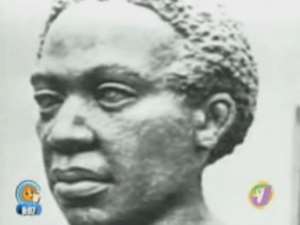
Sam Sharpe, leader of the Christmas Rebellion, or Baptist War, which took place in Jamaica in December 1831, was executed for his role in organising the revolt.
Even though Sharpe was a slave, he was permitted to practice as a Baptist preacher and travel to different plantations to hold religious meetings for his fellow slaves. It was thought that the teachings of the Bible would pacify any rebellious sentiments which slave might hold. Sharpe, however, used the many references to justice in the Bible to highlight the injustices of slavery. He also used the religious gatherings to plan the Christmas Rebellion.
Though the initial resistance was planned as a peaceful protest, Sharpe anticipating that the plantation owners would not accept their demands, also prepared the slaves for physical resistance and slelf defence. As anticipated the plantation owners moved swiftly to stamp out the rebellion in the harshest manner, and the peaceful protest turned into Jamaica's largest slave rebellion mobilising over 60,000 of Jamaica's 300,000 slave population. It lasted for ten days and resulted in the death of over 185 Africans and 14 white.
Reprisals for the rebellion were brutal. There were over 750 convictions of rebel slaves, 138 of which were sentenced to death. Many were hanged and their heads cut off and placed around the plantations as a warning to other slaves.
Sharpe, along with others identified as the ringleaders was executed by hanging. Just before he was hanged Sharpe said "I would rather die in yonder gallows, than live for a minute more in slavery."
The Jamaica government declared Sam Sharpe a national hero in 1975. The following video summarises Sam Sharpe's contribution to the abolition of slavery:




 NDC demands complete overhaul of security protocols at EC to safeguard electoral...
NDC demands complete overhaul of security protocols at EC to safeguard electoral...
 Ghana reaches interim deal with international bondholders — Finance Ministry
Ghana reaches interim deal with international bondholders — Finance Ministry
 Mahama to form joint army-police anti-robbery squads to safeguard 24-hour econom...
Mahama to form joint army-police anti-robbery squads to safeguard 24-hour econom...
 Another man jailed eight months over shrinking penis
Another man jailed eight months over shrinking penis
 Ghana to adjust external bond deal to meet IMF debt sustainability goals — Finan...
Ghana to adjust external bond deal to meet IMF debt sustainability goals — Finan...
 IMF negotiations: We've not failed to reach an agreement with bondholders; we’ve...
IMF negotiations: We've not failed to reach an agreement with bondholders; we’ve...
 EC begins recruitment of temporary electoral officials, closes on April 29
EC begins recruitment of temporary electoral officials, closes on April 29
 NPP lost the 2024 elections in 2022 due to inflation and cedi depreciation — Mar...
NPP lost the 2024 elections in 2022 due to inflation and cedi depreciation — Mar...
 Your good heart towards Ghana has changed; don’t behave like Saul - Owusu Bempah...
Your good heart towards Ghana has changed; don’t behave like Saul - Owusu Bempah...
 Wa West: NDC organizes symposium for Vieri Ward Women
Wa West: NDC organizes symposium for Vieri Ward Women
